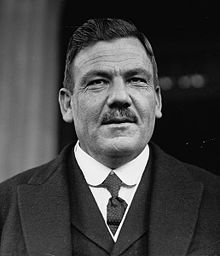
| History of Mexico |
|---|
 |
| Timeline |
|
|
The Maximato was a transitional period in the historical and political development of Mexico from 1 December 1928 to 1 December 1934. Named after former president Plutarco Elías Calles's sobriquet el Jefe Máximo (the maximum leader), the Maximato was the period in which Calles continued to exercise power and exert influence without holding the presidency. The six-year period was the term that President-elect Alvaro Obregón would have served if he had not been assassinated immediately after the July 1928 elections. There needed to be some kind of political solution to the presidential succession crisis. Calles could not hold the presidency again because of restrictions on re-election without an interval out of power, but he remained the dominant figure in Mexico.
There were two solutions to the crisis. Firstly, an interim president was to be appointed, followed by new elections. Secondly, Calles created an enduring political institution, the Partido Nacional Revolucionario (PNR), which held presidential power from 1929 to 2000.
The interim presidency of Emilio Portes Gil lasted from 1 December 1928 to 4 February 1930. He was passed over as candidate for the newly formed PNR in favor of a political unknown, Pascual Ortiz Rubio, who resigned in September 1932 in protest at Calles's continued wielding of the real power. The successor was Abelardo L. Rodríguez, who served out the rest of the term that ended in 1934. As President, Rodríguez exerted more independence from Calles than had Ortiz Rubio. That year's election was won by the former revolutionary general Lázaro Cárdenas, who had been chosen as the candidate for the PNR. Following the election, Calles attempted to exert control over Cárdenas, but with strategic allies Cárdenas outmaneuvered Calles politically and expelled him and his major allies from the country in 1936.
The Maximato was a transitional period of personal power for ex-President Calles, but the institutionalization of political power in the party structure was a major achievement in Mexican history.
